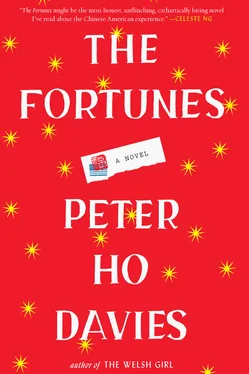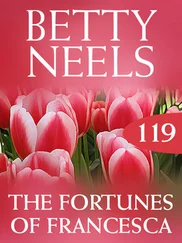The director is reading names off the cribs — Zhen, Jia — hoisting another child in her arms, squeezing her as if to plump her up, or like a vendor attesting to the ripeness of a melon. In her white coat, she looks suddenly less like a doctor or even a scientist than like a grocer.
“No,” John says quickly. “We can’t choose!” He looks warningly at Nola. “We can’t!” Though he knows for sure only that he can’t. It’s overwhelming. He looks down the ranks of cribs and feels the way he sometimes feels in big-box stores, Costco, Ikea, even as the comparison revolts him. But then it’s not just the sheer multiplicity. He can’t choose between even two options. He couldn’t choose what to do about their own pregnancy, after all, was only too happy to defer to Nola’s right to choose (that’s why, he realizes with a shock, she hates him a little bit), before that couldn’t, still can’t, choose China or America, wants both, which may be to say neither.
And what about the child? To be singled out, to live for all these others. To be one and represent many, and inevitably imperfectly — he knows what that feels like, that burden. There, gleaming darkly, is the germ of inauthenticity.
But Nola is nodding. “We can’t choose,” she agrees softly. But she’s not looking at him. The child has her finger in its tiny grip.
And this is what she wants, what they both want more than anything, not to choose, after all, but to be chosen. He by her, she by him, both of them by this child. It’s part of why he loves Nola, he thinks, because she, a white American, chose him.
Napoleon looks at them narrowly, perplexed. She has a spray of freckles across the bridge of her nose, John notices for the first time, and then he recognizes how pale she’s gone. “Okay, okay. She says, since you Chinese, John, she have a boy for you, tomorrow, next day latest.”
Baby penis. John shudders.
“I’m not that Chinese,” he says, and it’s true. He’s never felt more American. He’s finally reached the limit of his Chineseness, the outermost frontier, and it feels like a revelation, like making out the jagged line of the Great Wall from space. “We’re taking her.”
And Nola pulls the baby close. “She’s ours.”
And she is. By fate, by fortune, by luck, good or bad or both, which after all, commingled is fate. This man, this woman, this egg, this seed, this country, this town, this room, these people, this baby. The lucky ones.
He’d save them all if he could. But in the end one will have to stand for them all (though he leaves the envelope of money). It’s not right, of course. It’s fucked up. Many into one won’t go. And yet the alternative is worse: to save none, to walk away empty-handed. The only thing worse than choosing is not choosing. And yes, it’ll be a burden on the child, an intolerable one perhaps, but perhaps that’s also what luck is, what it should be: a burden, a duty, an obligation.
Napoleon smiles with relief, as if she’d been offering them her own child.
On the way back in the bus, he holds the child and she falls asleep on his chest and he curls around her and sleeps himself all the way back to the hotel. But she wakes with him too when they pull up, begins to wail — wet or hungry? — and they hurry inside, John jiggling the plush toy desperately in her face—“See the elephant!”—until Nola takes her. His past self, the self who came in and out of these doors earlier today even, suddenly seems impossibly distant, another person. The baby’s cries pin him to the present.
Napoleon bids them goodnight, reminds them of the morning’s itinerary. She’ll see them to the station, the train to Hong Kong, where they’ll complete the immigration paperwork at the U.S. consulate before flying home in a couple of days. John tries to thank her, show there’re no hard feelings, that they can trust each other to keep their secret. “We couldn’t have done it without you, any of us. You do incredible work.” She smiles tiredly. Dark filaments of hair float about her face like the pencil lines of a sketch. “You’re my last group,” she confides, not quite able to disguise her relief. “I’m quitting for when baby comes.” Her relief, John thinks, and perhaps too her distaste. He wonders if she’s always felt that way or only now that she carries her own child. Tomorrow they’ll tip her generously, proffer small gifts with both hands (cosmetics from Nola, American candy from John). Poor impersonal offerings. He had wanted to give her a copy of his book, but he knows it’s bad luck; book in Mandarin also means “loss.”
It’s late, and across the empty lobby John spies Pearl stepping out of an elevator. She walks toward them, tall in her heels, and he sees her taking them in, him, Nola, the bundle in Nola’s arms. Her face is unreadable — inscrutable, he thinks, despite himself — but when she meets them she pauses as if waiting for the last echo of her heels on the marble and gestures to the baby. Napoleon makes as if to shoo her away, but John says, “It’s all right.” He looks at Nola, and she steps forward. Pearl stares at the child for a long time, not baby-talking, not smiling, not waving. Waiting for the baby to see her, and still.
“Okay,” she says at last. She fixes John with a look and he nods once, the slightest bow. “Take her,” Pearl says. “Take her home.”
“Who was that?” Nola will ask him in the elevator, and he’ll shrug, avoid her eye. But later that night, when they need a name that isn’t a dead girl’s — not Mei, not Anna, it’d be bad luck — he’ll whisper it: Pearl. In the dark, sitting beside her, both of them awake now, watching the baby sleep, he’ll hear Nola thinking about it, and he’ll press his lips to her hair in a kiss— mother of Pearl —and feel her ease against him.
“I wonder what she’ll be,” Nola murmurs a little later. “Listen to me. Typical mom.” But he holds her tightly. It’s good to be typical for once, to ask a question they haven’t allowed themselves for years.
“I’ll settle for happy and healthy,” he says, because he already aches for her to be successful. Nola stifles a yawn. “Happy and healthy… and rich and famous.”
“I always wanted to be a rock star,” she says, giggling. “Olivia Newton-John.”
“What a coincidence. I always wanted you to be Olivia Newton-John too.”
She head-butts him softly.
“I always wanted to be an astronaut,” he recalls. Specifically, the first Chinese American in space, as he’d announced at the front of some grade-school class (he’s startled to think there was a time when he’d innocently embraced his identity, seen it as an advantage).
“Never say never.”
“I’m pretty sure there already has been — a couple, at least.” Saying it, he dimly recalls one or both of them being asked if they could see the Great Wall from space and that in fact the answer was no (and, even more surprisingly, that the idea itself predated the space program, dating back to turn-of-the-century speculation about canals on Mars). Even if it had been true, he’s read recently that huge swaths of China are increasingly invisible from space beneath a blanket of smog.
Still, maybe Pearl could be the first Chinese American on the moon, or even Mars. The Chinese, he knows, have plans for human exploration of space, even if NASA’s mission seems to be faltering. He’d done a little research a while back about the Chinese space program, the brainchild of a brilliant scientist called H. S. Tsien, who’d trained at Caltech before the war, helped recruit Werner von Braun to NASA, but been jailed and then deported in the Red scare of the 1950s. The Chinese already have a rudimentary space station on the drawing board — what was it called? Heavenly Palace. And a moon rover called Jade Rabbit. So why not the first Chinese American on the moon, maybe as part of some joint venture.
Читать дальше












